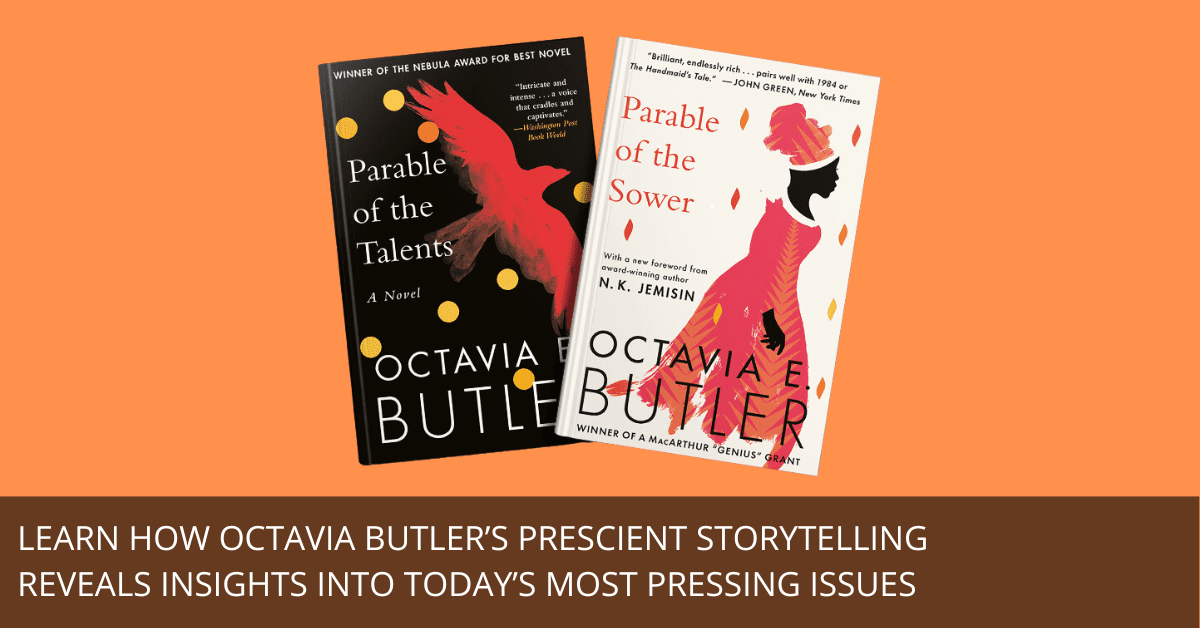
Octavia Butler wasn’t just a writer. She was a visionary, a futurist with a knack for spotting patterns most people missed. Although her novels Parable of the Sower and Parable of the Talents were written in the 1990s, they feel more like a mirror held up to America as we approach 2025.
Butler’s vision wasn’t just about predicting disasters. It was about offering solutions—actionable steps to survive, adapt, and thrive.
Let’s break down what she saw, why it matters, and how you can use her insights to prepare for whatever comes next.
Nostalgia as a Weapon: “Make America Great Again”
Butler’s Parable of the Talents features a charismatic leader, Andrew Steele Jarret, whose slogan is painfully familiar: “Make America Great Again.” Sound like anyone you’ve heard of?
Jarret’s rise isn’t just a plot device. It’s a lesson. Nostalgia is powerful. It taps into fear, insecurity, and a longing for an idealized past. But here’s the catch:
That “great” past? It rarely existed for everyone.
Butler’s characters live in a world divided by fear of the future and clinging to the false promise of the past. Recognize this pattern, and you can resist it.
Here’s how to stay clear-headed:
- Question slogans and promises that idealize the past. Ask: Whose version of the past are we talking about?
- Stay grounded in facts. Nostalgia often ignores inconvenient truths. Read history that reflects multiple perspectives, not just the comfortable ones.
- Focus on building a better future, not recreating a flawed past.
Climate Collapse: No Longer Fiction
In Parable of the Sower, society crumbles under the weight of environmental disasters. Wildfires rage. Water is scarce. Food prices soar. Sound familiar?
Today’s climate headlines could be ripped straight from Butler’s pages. The difference? You still have a chance to act.
Here are three steps to build resilience:
- Learn to live with less. Start small. Cut back on water and energy use. Swap your lawn for drought-tolerant landscaping. Every adjustment counts.
- Get community-minded. Lauren Olamina, Butler’s protagonist, survives by building a network of allies. Join local groups focused on climate action or mutual aid.
- Stay informed and adaptable. Climate change demands flexibility. Invest in skills that are universally useful—gardening, first aid, and basic repair work.
The goal? Prepare without panic. Small, consistent steps beat doomsday prepping every time.
Economic Inequality: The Wealth Gap Widened
Butler’s world divides sharply between the haves and the have-nots. The rich retreat to walled-off enclaves while the poor fend for scraps. It’s a brutal vision… and it’s closer than you think.
Consider this: In 2023, America’s top 1 percent held more wealth than the bottom 50 percent. That divide keeps growing.
So what can you do?
- Diversify your income streams. Don’t rely on one paycheck. Explore freelance work, investments, or selling skills online.
- Build local support systems. If the system fails, your community becomes your safety net. Share resources, trade skills, and build trust.
- Educate yourself financially. Learn basic budgeting, saving, and investing. Butler’s characters often struggle because they’re trapped in systems they can’t escape. Don’t let that be you.
Authoritarianism: Recognizing the Warning Signs
Jarret’s presidency in Parable of the Talents thrives on religious extremism and divisive rhetoric. His regime persecutes anyone who doesn’t fit the mold of his “Christian America.”
The lesson here is blunt: Authoritarianism doesn’t start with a bang. It creeps in slowly, disguised as promises of safety and unity.
Protect yourself and your values:
- Stay politically engaged. Vote, organize, and pay attention to local elections. Small actions add up.
- Speak up early. Call out intolerance, even when it’s subtle. Today’s casual racism or sexism can fuel tomorrow’s policies.
- Safeguard your rights. Know your constitutional rights, and stay informed about how they’re being challenged. Protect yourself legally and socially.
Building a New Future: Lessons from Earthseed
Lauren Olamina’s Earthseed philosophy is the heart of Parable of the Sower. Its central tenet is deceptively simple: God is Change.
This belief isn’t about passive acceptance. It’s about embracing adaptability and taking responsibility for shaping the future.
Here’s how to apply Earthseed to your life:
- Accept change as inevitable. Resisting change wastes energy. Focus on how you can adapt and thrive.
- Set long-term goals. Earthseed’s ultimate vision is for humanity to reach the stars. What’s your “star”? Write it down and work backward to make it actionable.
- Build your “tribe.” Lauren’s strength comes from her community. Surround yourself with people who share your values and will grow with you.
Putting It All Together
Octavia Butler’s books aren’t just stories. They’re roadmaps for navigating uncertainty. Whether it’s climate chaos, political unrest, or economic instability, her insights can guide you to action, not paralysis.
Start small:
- Question narratives that idealize the past.
- Cut back on resources and build resilience.
- Stay informed about your rights and your finances.
And most importantly, find your community. Lauren Olamina didn’t survive alone, and neither will you. Together, you can face change—and shape it—just as Butler envisioned.
Because if there’s one thing her work teaches us, it’s this:
The future belongs to those who are ready to build it.

